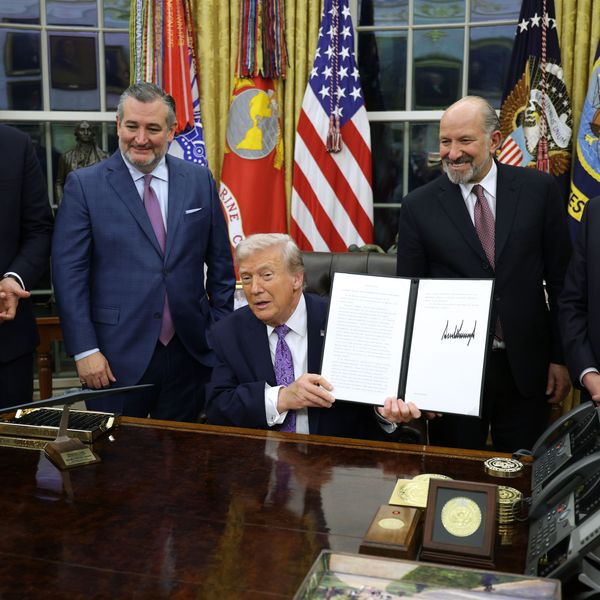
Internet defenders are warning against ill-advised changes to Section 230 of the Communications Decency Act, one of the most important guarantors of internet freedom. (Photo: Getty stock)
Leading Digital Rights Group Warns Section 230 Reform Bill Will Boost Big Tech While Crushing Smaller Sites
"This bill, as written, would have enormous unintended consequences for human rights and freedom of expression," warned Fight for the Future's Evan Greer.
A leading digital rights group on Friday sounded the alarm on a bill introduced by Senate Democrats aimed at reforming Section 230 of the Communications Decency Act, warning that although well-intentioned, the measure would "have enormous unintended consequences" that would boost the power of Big Tech at the expense of smaller websites and online freedom.
"It would solidify the monopoly power of the largest tech companies like Facebook and Google while crushing small sites and rendering the Internet almost completely unusable for activism and organizing."
--Evan Greer,
Fight for the Future
The SAFE TECH Act (pdf)--introduced by Sens. Mazie Hirono (D-Hawaii), Amy Klobuchar (D-Minn.), and Mark Warner (D-Va.)--changes key language in Section 230, which largely protects websites, including social media platforms, from being held legally liable for content posted by third-party users. The new language proposed by the senators would no longer extend protection when payment is involved.
"For years, Section 230 provided a 'Get Out of Jail Free' card to platform companies as their sites are openly and repeatedly used by bad actors to cause damage and injury," Warner explained in a series of tweets promoting the new bill. "The SAFE TECH Act doesn't interfere with free speech--it's about allowing these platforms to finally be held accountable for harmful, often criminal behavior enabled by their platforms to which they have turned a blind eye for too long."
\u201cSec 230 was supposed to incentivize internet platforms to police harmful content posted by users.\n\nInstead, the law acts as a shield allowing them to turn a blind eye. The SAFE TECH Act brings Sec 230 into the modern age and makes platforms accountable for the harms they cause.\u201d— Senator Mazie Hirono (@Senator Mazie Hirono) 1612557470
Under former President Donald Trump, Section 230 was in the administration's crosshairs, as social media companies policed or blocked the president's false, misleading, and inflammatory content. Democrats--including now-President Joe Biden during the 2020 presidential campaign--also proposed repealing or significantly modifying Section 230, not because it restricted free speech but rather because it allowed the dissemination of lies and incitement.
Section 230 came under increased scrutiny in the wake of the deadly January 6 attack on the U.S. Capitol by right-wing extremists, many of whom used social media to foment and organize the insurrection.
Last week, a coalition of internet defenders cautioned lawmakers against responding to the Capitol attack by making ill-advised changes to Section 230. However, Evan Greer, deputy director of Fight for the Future, said on Friday that the SAFE TECH Act does just that.
\u201cThis bill \u201ccreates a huge carveout in Section 230 that impacts not only advertising but essentially all paid services, such as web hosting and [content delivery networks], as well as small services like Patreon, Bandcamp, and Etsy\u201d says FFTF's @evan_greer \nhttps://t.co/zCoGEVVoqV\u201d— @team@fightforthefuture.org on Mastodon (@@team@fightforthefuture.org on Mastodon) 1612565786
"We absolutely agree that Congress needs to take meaningful action to address the real world harm being done by Big Tech companies' surveillance capitalist business models," Greer said in a statement. "But unfortunately this bill, as written, would have enormous unintended consequences for human rights and freedom of expression. It creates a huge carveout in Section 230 that impacts not only advertising but essentially all paid services, such as web hosting and CDNs, as well as small services like Patreon, Bandcamp, and Etsy."
Greer continued:
While it appears the bill's sponsors intended to make targeted changes to Section 230, as written this bill essentially guts Section 230. It would solidify the monopoly power of the largest tech companies like Facebook and Google while crushing small sites and rendering the internet almost completely unusable for activism and organizing. We urge lawmakers to pass the SAFE Sex Worker[s] Study Act to investigate the harm done by SESTA/FOSTA, and hold hearings about the potential human rights and civil liberties implications of changing Section 230 before advancing legislation that could do tremendous harm.
"We hope to work with the bill's sponsors and supporters to work toward meaningful policy changes to hold Big Tech companies accountable for their role in undermining democracy and basic rights," added Greer. "We urge swift action on measures such as strong data privacy legislation and enforcement of antitrust and civil rights laws."
An Urgent Message From Our Co-Founder
Dear Common Dreams reader, The U.S. is on a fast track to authoritarianism like nothing I've ever seen. Meanwhile, corporate news outlets are utterly capitulating to Trump, twisting their coverage to avoid drawing his ire while lining up to stuff cash in his pockets. That's why I believe that Common Dreams is doing the best and most consequential reporting that we've ever done. Our small but mighty team is a progressive reporting powerhouse, covering the news every day that the corporate media never will. Our mission has always been simple: To inform. To inspire. And to ignite change for the common good. Now here's the key piece that I want all our readers to understand: None of this would be possible without your financial support. That's not just some fundraising cliche. It's the absolute and literal truth. We don't accept corporate advertising and never will. We don't have a paywall because we don't think people should be blocked from critical news based on their ability to pay. Everything we do is funded by the donations of readers like you. Will you donate now to help power the nonprofit, independent reporting of Common Dreams? Thank you for being a vital member of our community. Together, we can keep independent journalism alive when it’s needed most. - Craig Brown, Co-founder |
A leading digital rights group on Friday sounded the alarm on a bill introduced by Senate Democrats aimed at reforming Section 230 of the Communications Decency Act, warning that although well-intentioned, the measure would "have enormous unintended consequences" that would boost the power of Big Tech at the expense of smaller websites and online freedom.
"It would solidify the monopoly power of the largest tech companies like Facebook and Google while crushing small sites and rendering the Internet almost completely unusable for activism and organizing."
--Evan Greer,
Fight for the Future
The SAFE TECH Act (pdf)--introduced by Sens. Mazie Hirono (D-Hawaii), Amy Klobuchar (D-Minn.), and Mark Warner (D-Va.)--changes key language in Section 230, which largely protects websites, including social media platforms, from being held legally liable for content posted by third-party users. The new language proposed by the senators would no longer extend protection when payment is involved.
"For years, Section 230 provided a 'Get Out of Jail Free' card to platform companies as their sites are openly and repeatedly used by bad actors to cause damage and injury," Warner explained in a series of tweets promoting the new bill. "The SAFE TECH Act doesn't interfere with free speech--it's about allowing these platforms to finally be held accountable for harmful, often criminal behavior enabled by their platforms to which they have turned a blind eye for too long."
\u201cSec 230 was supposed to incentivize internet platforms to police harmful content posted by users.\n\nInstead, the law acts as a shield allowing them to turn a blind eye. The SAFE TECH Act brings Sec 230 into the modern age and makes platforms accountable for the harms they cause.\u201d— Senator Mazie Hirono (@Senator Mazie Hirono) 1612557470
Under former President Donald Trump, Section 230 was in the administration's crosshairs, as social media companies policed or blocked the president's false, misleading, and inflammatory content. Democrats--including now-President Joe Biden during the 2020 presidential campaign--also proposed repealing or significantly modifying Section 230, not because it restricted free speech but rather because it allowed the dissemination of lies and incitement.
Section 230 came under increased scrutiny in the wake of the deadly January 6 attack on the U.S. Capitol by right-wing extremists, many of whom used social media to foment and organize the insurrection.
Last week, a coalition of internet defenders cautioned lawmakers against responding to the Capitol attack by making ill-advised changes to Section 230. However, Evan Greer, deputy director of Fight for the Future, said on Friday that the SAFE TECH Act does just that.
\u201cThis bill \u201ccreates a huge carveout in Section 230 that impacts not only advertising but essentially all paid services, such as web hosting and [content delivery networks], as well as small services like Patreon, Bandcamp, and Etsy\u201d says FFTF's @evan_greer \nhttps://t.co/zCoGEVVoqV\u201d— @team@fightforthefuture.org on Mastodon (@@team@fightforthefuture.org on Mastodon) 1612565786
"We absolutely agree that Congress needs to take meaningful action to address the real world harm being done by Big Tech companies' surveillance capitalist business models," Greer said in a statement. "But unfortunately this bill, as written, would have enormous unintended consequences for human rights and freedom of expression. It creates a huge carveout in Section 230 that impacts not only advertising but essentially all paid services, such as web hosting and CDNs, as well as small services like Patreon, Bandcamp, and Etsy."
Greer continued:
While it appears the bill's sponsors intended to make targeted changes to Section 230, as written this bill essentially guts Section 230. It would solidify the monopoly power of the largest tech companies like Facebook and Google while crushing small sites and rendering the internet almost completely unusable for activism and organizing. We urge lawmakers to pass the SAFE Sex Worker[s] Study Act to investigate the harm done by SESTA/FOSTA, and hold hearings about the potential human rights and civil liberties implications of changing Section 230 before advancing legislation that could do tremendous harm.
"We hope to work with the bill's sponsors and supporters to work toward meaningful policy changes to hold Big Tech companies accountable for their role in undermining democracy and basic rights," added Greer. "We urge swift action on measures such as strong data privacy legislation and enforcement of antitrust and civil rights laws."
A leading digital rights group on Friday sounded the alarm on a bill introduced by Senate Democrats aimed at reforming Section 230 of the Communications Decency Act, warning that although well-intentioned, the measure would "have enormous unintended consequences" that would boost the power of Big Tech at the expense of smaller websites and online freedom.
"It would solidify the monopoly power of the largest tech companies like Facebook and Google while crushing small sites and rendering the Internet almost completely unusable for activism and organizing."
--Evan Greer,
Fight for the Future
The SAFE TECH Act (pdf)--introduced by Sens. Mazie Hirono (D-Hawaii), Amy Klobuchar (D-Minn.), and Mark Warner (D-Va.)--changes key language in Section 230, which largely protects websites, including social media platforms, from being held legally liable for content posted by third-party users. The new language proposed by the senators would no longer extend protection when payment is involved.
"For years, Section 230 provided a 'Get Out of Jail Free' card to platform companies as their sites are openly and repeatedly used by bad actors to cause damage and injury," Warner explained in a series of tweets promoting the new bill. "The SAFE TECH Act doesn't interfere with free speech--it's about allowing these platforms to finally be held accountable for harmful, often criminal behavior enabled by their platforms to which they have turned a blind eye for too long."
\u201cSec 230 was supposed to incentivize internet platforms to police harmful content posted by users.\n\nInstead, the law acts as a shield allowing them to turn a blind eye. The SAFE TECH Act brings Sec 230 into the modern age and makes platforms accountable for the harms they cause.\u201d— Senator Mazie Hirono (@Senator Mazie Hirono) 1612557470
Under former President Donald Trump, Section 230 was in the administration's crosshairs, as social media companies policed or blocked the president's false, misleading, and inflammatory content. Democrats--including now-President Joe Biden during the 2020 presidential campaign--also proposed repealing or significantly modifying Section 230, not because it restricted free speech but rather because it allowed the dissemination of lies and incitement.
Section 230 came under increased scrutiny in the wake of the deadly January 6 attack on the U.S. Capitol by right-wing extremists, many of whom used social media to foment and organize the insurrection.
Last week, a coalition of internet defenders cautioned lawmakers against responding to the Capitol attack by making ill-advised changes to Section 230. However, Evan Greer, deputy director of Fight for the Future, said on Friday that the SAFE TECH Act does just that.
\u201cThis bill \u201ccreates a huge carveout in Section 230 that impacts not only advertising but essentially all paid services, such as web hosting and [content delivery networks], as well as small services like Patreon, Bandcamp, and Etsy\u201d says FFTF's @evan_greer \nhttps://t.co/zCoGEVVoqV\u201d— @team@fightforthefuture.org on Mastodon (@@team@fightforthefuture.org on Mastodon) 1612565786
"We absolutely agree that Congress needs to take meaningful action to address the real world harm being done by Big Tech companies' surveillance capitalist business models," Greer said in a statement. "But unfortunately this bill, as written, would have enormous unintended consequences for human rights and freedom of expression. It creates a huge carveout in Section 230 that impacts not only advertising but essentially all paid services, such as web hosting and CDNs, as well as small services like Patreon, Bandcamp, and Etsy."
Greer continued:
While it appears the bill's sponsors intended to make targeted changes to Section 230, as written this bill essentially guts Section 230. It would solidify the monopoly power of the largest tech companies like Facebook and Google while crushing small sites and rendering the internet almost completely unusable for activism and organizing. We urge lawmakers to pass the SAFE Sex Worker[s] Study Act to investigate the harm done by SESTA/FOSTA, and hold hearings about the potential human rights and civil liberties implications of changing Section 230 before advancing legislation that could do tremendous harm.
"We hope to work with the bill's sponsors and supporters to work toward meaningful policy changes to hold Big Tech companies accountable for their role in undermining democracy and basic rights," added Greer. "We urge swift action on measures such as strong data privacy legislation and enforcement of antitrust and civil rights laws."

